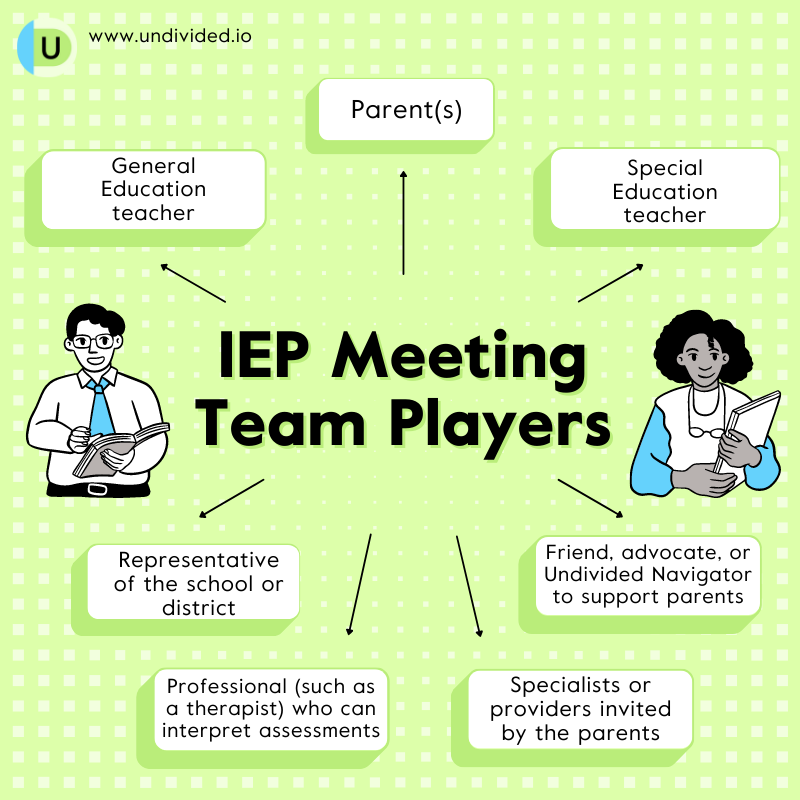IEP Meeting Team Players and Their Roles

The Individuals with Disabilities Act (IDEA) states that the following individuals must participate in developing a student’s IEP:
- The parent(s)
- General education teacher (if applicable)
- Special education teacher
- A representative of the school or district who is qualified to discuss and oversee the IEP, and has knowledge of both the general curriculum and public resources
- An individual, such as a therapist, who can interpret the results of assessments
- An additional specialist invited by the parent(s) or school, such as an advocate, or a private therapist or specialist (optional)
Remember: An individual on the IEP team can assume more than one of the above roles.
By the time the student turns 16 (or earlier in some states), the IEP meeting must also include:
- A transition services representative
- The student (especially when post-secondary goals are discussed)
Parents can invite a friend, their Regional Center coordinator, their Undivided Navigator, or an education advocate to provide extra support and insights about the student.
Who can be excused from attending the IEP meeting?
Teachers, school and district representatives, and therapists are not required to attend the meeting if their area of curriculum or expertise are not being discussed, and if both the parents and the school agree in writing to excuse them.
Teachers, school and district representatives, and therapists may also be excused from the meeting if they submit their contributions (such as assessments and goals) to parents and the IEP team prior to the meeting.
What are the primary goals of the key players on an IEP team?
Let’s attend a hypothetical IEP meeting for an elementary school–aged child with multiple diagnoses. Who are the attendees and what are their objectives?
The parent(s): The parent is prepared to discuss their concerns. These might include their child’s immediate and big-picture strengths, needs, and goals. If they do not agree with the child’s present levels or goals, or want to add additional service minutes, they should bring copies of progress reports and their own progress tracking to support their perspective.
General education teacher: Whether your child sees a gen ed teacher for five hours a day or none, the law requires a regular education teacher if the child is, or may be, participating in the regular education environment. Their role is to speak to grade-level content and standards.
Special education teacher: The SpEd teacher is often the teacher best suited to speak to the student’s strengths and weaknesses. If the student needs remediation in some areas, the SpEd teacher will be the one responsible for helping the IEP team come up with a plan to address those needs. This teacher might also be responsible for overseeing the implementation of the IEP.
School psychologist: In some schools, the school psychologist is the one responsible for the oversight of the student’s IEP. This role includes taking notes on the meeting and making any changes to the actual IEP.
Therapists and specialists: If your child sees the school’s occupational, physical, behavioral, vision, or speech therapist, their adapted physical education teacher, or receives tech-based accommodations such as an iPad or AAC device, the corresponding therapist or assistive technology specialist may also attend the meeting to discuss and present their portion of the IEP, including present levels and the goals they’ve developed for the year.
The principal: In some districts, the principal may attend the IEP meeting as well. They should have knowledge of the types of resources the school can provide, and might also be a former teacher. The principal may also serve as the note-taker during the meeting, and can also mediate disagreements and help make decisions on any changes in the student’s schedule or services.
It's a good idea to request that every school-based therapist involved in your child's education attend to discuss their progress and goals.
Join for free
Save your favorite resources and access a custom Roadmap.
Get StartedAuthor


